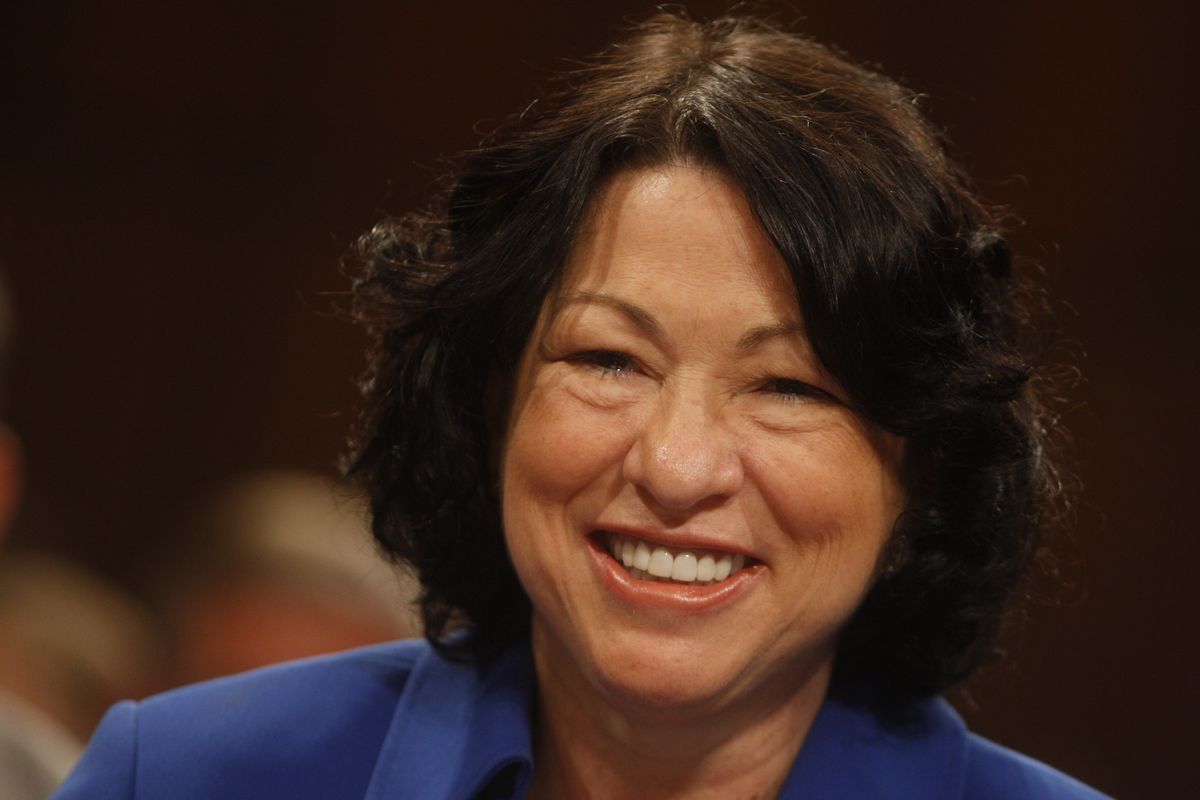Sotomayor says she’ll apply law
High court nominee’s Senate hearings begin

WASHINGTON – Sonia Sotomayor told her up-from-the-bootstraps story Monday to the Senate Judiciary Committee and vowed that a judge’s role is “not to make law; it is to apply the law.” But skeptical Republicans warned that they will ask tough questions beginning today about her background and activism.
The 55-year-old federal appellate judge tried to reassure the committee Monday that she would be impartial.
“In the past month, many senators have asked me about my judicial philosophy,” the first Hispanic Supreme Court nominee said. “It’s simple: fidelity to the law.”
Sotomayor’s testimony capped a day in which Democrats hailed the historic nature of her nomination and Republicans raised questions about whether she displayed too much empathy in her rulings.
By the end of the day – a largely polite five hours of opening statements by the nominee and the committee’s 12 Democrats and seven Republicans – there were no obvious roadblocks to her confirmation.
“Unless you have a complete meltdown, you’re going to get confirmed,” said Sen. Lindsey Graham, R-S.C., even though he and his Republican colleagues offered a long list of concerns.
The committee’s senators will begin questioning Sotomayor today; each will get about 30 minutes. On Monday, the Republicans made their line of questioning clear.
“President Obama said that he would nominate judges based on their ability to empathize in general and with certain groups in particular. This empathy standard is troubling to me,” said Sen. Charles Grassley, R-Iowa. “The Constitution requires that judges be free from personal politics, feelings and preferences.”
Sotomayor signaled that she was ready for their queries. She opened her testimony by acknowledging her mother and brother, turning around to whisper to her mother, “Mom, thank you,” and then recalling her days growing up in the South Bronx.
“The progression of my life has been uniquely American,” she said. “My parents left Puerto Rico during World War II. I grew up in modest circumstances in a Bronx housing project. My father, a factory worker with a third-grade education, passed away when I was 9 years old.”
Her mother taught her “the key to success in America is a good education.” As a lawyer, she’s seen the judicial system from several perspectives: as a prosecutor in New York, a corporate attorney, a trial judge and an appellate judge.
Further, she said in a retort to Republican criticism that she gets too personal in her rulings, “My career as an advocate ended – and my career as a judge began – when I was appointed by President George H.W. Bush to the United States District Court for the Southern District of New York” in 1992.
Sen. Jeff Sessions of Alabama, the committee’s top Republican, later offered the Republican philosophy, expressing his concern that too often “a judge is free to push his or her own courtroom political and social agenda. I reject this view.”
Too often, he charged, Sotomayor has a philosophy that “allows subjectivity” and affects her rulings on issues such as abortion, gun control, private property rights and capital punishment.
Sessions and other Republicans vowed to scrutinize her controversial rulings and Hispanic-rights activism.
From 1980 to 1992, Sotomayor was active with the Puerto Rican Legal Defense and Education Fund, whose priorities ranged from boosting bilingual education to opposing the death penalty.
Republican critics cite these Puerto Rican advocacy efforts as a signal that Sotomayor is outside the mainstream.
Graham also pointed to her 2001 comment that a “wise Latina” could come to better conclusions than white males as particularly troubling.
“If I’d said anything remotely like that, my career would be over,” Graham said. “I think your experience can add a lot to the court, but I don’t think it makes you better than anyone else.”
Sotomayor also sided in a recent discrimination case with the city of New Haven, Conn., which denied promotions to several white firefighters because no blacks and only one Hispanic scored high enough on the promotion exam. The Supreme Court overturned that decision last month.
Republicans are aware, however, that they need to be careful not to alienate Hispanics by appearing to attack Sotomayor unfairly.
“My Republican colleagues who vote against you, I assure you, could vote for a Hispanic nominee,” Graham told Sotomayor, adding that he hasn’t decided how he’ll vote. “They just feel unnerved by your speeches and by some of the things that you’ve said and some of your cases.”
Sotomayor made it clear she’s ready to address those concerns.
“Throughout my 17 years on the bench, I have witnessed the human consequences of my decisions,” she said. “Those decisions have been not made to serve the interests of any one litigant, but always to serve the larger interest of impartial justice.”
In the days ahead, she said, she hoped it would become clear “that my record in two courts reflects my rigorous commitment to interpreting the Constitution according to its terms; interpreting statutes according to their terms and Congress’ intent; and hewing faithfully to precedents established by the Supreme Court and by my circuit court.”
“In each case I have heard, I have applied the law to the facts at hand,” Sotomayor said.